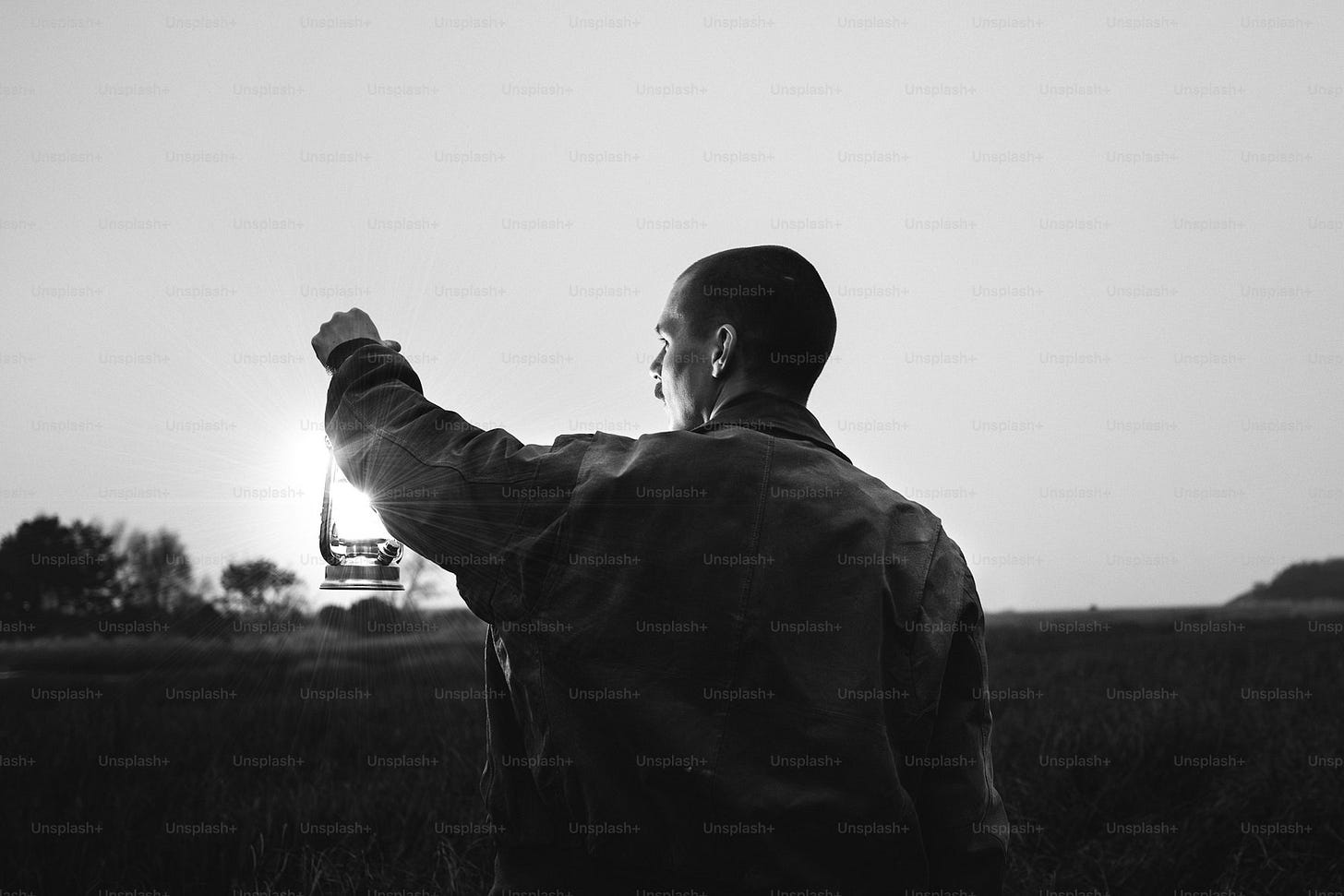Following a Fictional Priest into This Dull, Ruinous Landscape
A Reading of "The Haw Lantern" by Seamus Heaney
“and you flinch before its bonded pith and stone,
its blood-prick that you wish would test and clear you”
I have an ambivalent relationship with this poem. It’s beautiful: the sounds, the images, the hauntedness. It’s damning: the lantern in search of one good person passes each of us by. Diogenes was an uncomfortable fellow, at least in legendary, which is all we have of him. But he also left behind the image of a man wandering the daytime streets with a lit lantern, looking for “one honest man.” Heaney translates “honest” into “just.”
My husband and I have been watching Season Two of the postapocalyptic miniseries Silo. In the first episode, protagonist Juliette lights a dystopian lantern and enters an empty silo. The place has been abandoned by hopeful residents who believed the air outside was breathable, the landscape hospitable to life. They were wrong. Juliette cracks careful footsteps around and over their many carcasses, carefully avoiding the gaze of sightless eyes. She is trying to stay alive herself.
I have been reading a novel that is shattering me—The Last Report on the Miracles at Little No Horse by Louise Erdrich. It’s about a priest, because…my obsession with books about monasteries and priests. (It’s by an indigenous writer about indigenous lives, because November. Because America. Because humanity.) As I watched Juliette avoid the bones on screen to lead with her lantern through the enormous, metal silo door, I imagined instead Erdrich’s fictional Father Damien Modeste, who is led by heart, by spirit, by care of others, by life. What would a priest like him do in this death-drenched circumstance?
I watch him crest the rise around the silo and catch sight of the hundreds and hundreds of irradiated bodies. Whereas Juliette, ahead of him, moves past the human wreckage into the safety of the silo—the air is breathable in there—Father Damien remains outside. Juliette holds her lantern high to find her way; Damien holds his lantern low, trying to catch the gaze of sightless eyes. He moves his free hand from head to heart and shoulder to shoulder, blessing the souls that have moved on. He is not afraid of death. He is merely sad about it—a good, clean emotion—sorrowing for the ones who could not make it in this “dull, ruinous landscape.”
In Heaney’s poem, the imagined Diogenes looks “you”—me, the reader—uncomfortably in the eye:
“so you end up scrutinized from behind the haw
he holds up at eye-level on its twig”We flinch, Heaney says. We all want to be tested and cleared: “Here, indeed, is a just man!” That’s me! And we fear what Heaney says happens—that Diogenes will scan us, not see what he is looking for, and move on. That we will fail the test. What test? We are but small people. We are only human, frail and easily damaged, easily lost to the poisoned air of the ruinous landscape. What does it mean, Seamus Heaney, to “keep / the wick of self-respect from dying out”?
What if it doesn’t look like Diogenes and his cool assessment, or even Juliette and her understandable self-preservation? Maybe it looks like turning away from ourselves so we can look others in the eye when we’d rather not. When what we see isn’t comfortable. When it requires something of us, when it makes us have to remember that we are, each of us, embodied souls who matter, who matter, who matter. An entire people, small but also large, who need, as individuals and as a collective, to keep burning the light of respect for what we are, which is, my dear ones, not people who need to pass a test, but who are already, in our essence, greatly beloved.
“…a small light for small people,
wanting no more from them but that they keep
the wick of self-respect from dying out”





I skipped around in this so I could avoid any Silo spoilers. I don't have the patience to wait a week between episodes so I have to wait to start season 2 when all the episodes have dropped. Same with Bad Sisters. When I think about the lantern, I just always go to Emily Dickinson who is "out with a lantern looking for myself." (Or at least the close to the quote accuracy without double checking)
I’m reading this through the lens of WNC need, post-Helene. How am I using my lantern? Thank you for helping me sift my soul.